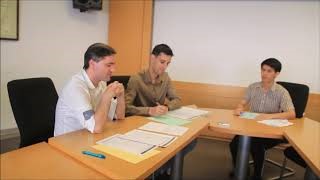DELF A2 speaking test
Presentation and proceedings of DELF A2 oral production

To better understand the DELF A2 speaking test, we advise you to study DELF A2 sample papers.
The whole DELF A2 oral production is on 25 points. It is a quarter of the total mark of DELF A2 which is 100. Each other skill (listening, reading, writing) is also on 25 points. To get the diploma, you must have 50/100 minimum and get a minimum of 5/25 at each skill. If you get under 5 at one skill, it is a eliminatory mark even if you get 50/100 minimum at all. For example, if you get a total mark of 56/100 but you have 4/25 at one skill, you are eliminated. and you do not get the diploma.
Video of an example of DELF A2 speaking test
1st part of DELF A2 speaking test: guided conversation
This part is scored on 4 points out of the 25 points assigned to DELF A2 speaking test. For this part, there are two assessment criteria:
1) Peut établir un contact social, se présenter et décrire son environnement familier. (Can establish social contact, introduce himself and describe his familiar environment.) = 3 points.
2) Peut répondre et réagir à des questions simples. Peut gérer une interaction simple. (Can answer and respond to simple questions. Can manage a simple interaction.) = 1 point.
2nd part of DELF A2 speaking test: followed monologue
This part is rated on 5 points out of the 25 points assigned to the DELF A2 speaking test. For this part, there are two assessment criteria:
1) Peut présenter de manière simple un événement, une activité, un projet, un lieu, etc. liés à un contexte familier. (Can simply present an event, activity, project, location, etc. related to a familiar context.) = 3 points.
2) Peut relier entre elles les informations apportées de manière simple et claire. (Can link information provided in a simple a clear manner.) = 2 points.
3rd part of DELF A2 speaking test: interactive exercise
The interactive exercise of DELF A2 oral production lasts approximately 3 to 4 minutes. The aim of this part is to “solve a situation of daily life”. Here, the candidate must dialogue with the examiner in order to resolve a situation of daily life. He must also show that he is capable of greeting and using the basic rules of politeness.
This part is rated on 6 points out of the 25 points assigned to the DELF A2 oral production. For this part, there are two assessment criteria:
1) Peut demander et donner des informations dans des transactions simples de la vie quotidienne. Peut faire accepter ou refuser des propositions. (Can request and give information in simple transactions of daily life. Can have proposals accepted or refused.) = 4 points.
2) Peut entrer dans des relations sociales simplement mais efficacement, en utilisant les expressions courantes et en suivant les usages de base. (Can enter into social relationships simply but effectively, using common expressions and following basic usages.) = 2 points.
Assessment of vocabulary, grammar and pronunciation of DELF A2 speaking test
As we saw above, the three parts of the DELF A2 oral production are on 15 points out of the 25 points of the DELF A2 speaking test. To be simple, the assessment criteria of those three parts correspond with practical, pragmatic skills. The 10 points left are assessed on the language control: lexicon (vocabulary), morphosyntax (grammar), phonological system (pronunciation) and for the whole two parts. The assessment criteria are:
1) Lexicon (vocabulary range and accuracy): peut utiliser un répertoire limité mais adéquat pour gérer des situations courantes de la vie quotidienne. (Can use a limited but adequate lexical repertoire to manage common situations in daily life) = 3 points.
2) Morphosyntax: peut utiliser des structures et des formes grammaticales simples. Le sens général reste clair malgré la présence systématique d’erreurs élémentaires. (Can use simple structures and grammatical forms. The general sense remains clear despite the systematic presence of elementary errors) = 4 points.
3) Control of the phonological system: peut s’exprimer de façon suffisamment claire. L’interlocuteur devra parfois faire répéter. (Can express himself in a sufficiently clear manner. The interlocutor will sometimes have to make him repeat.) = 3 points.
Further information on DELF A2 speaking test
You may consult and download the instructions, the assessment grid and past exam papers of the DELF A2 oral production on this page: DELF A2 sample papers.
We recommend that you work on the last version of the DELF A2 speaking test assessment grid. We advise you to study this assessment grid, because it is on it that you will be assessed and marked. So, if you well control the assessment criteria and you fit them well, you will get the maximum of points.
You can also consult our book recommendations to prepare for the DELF A2.



